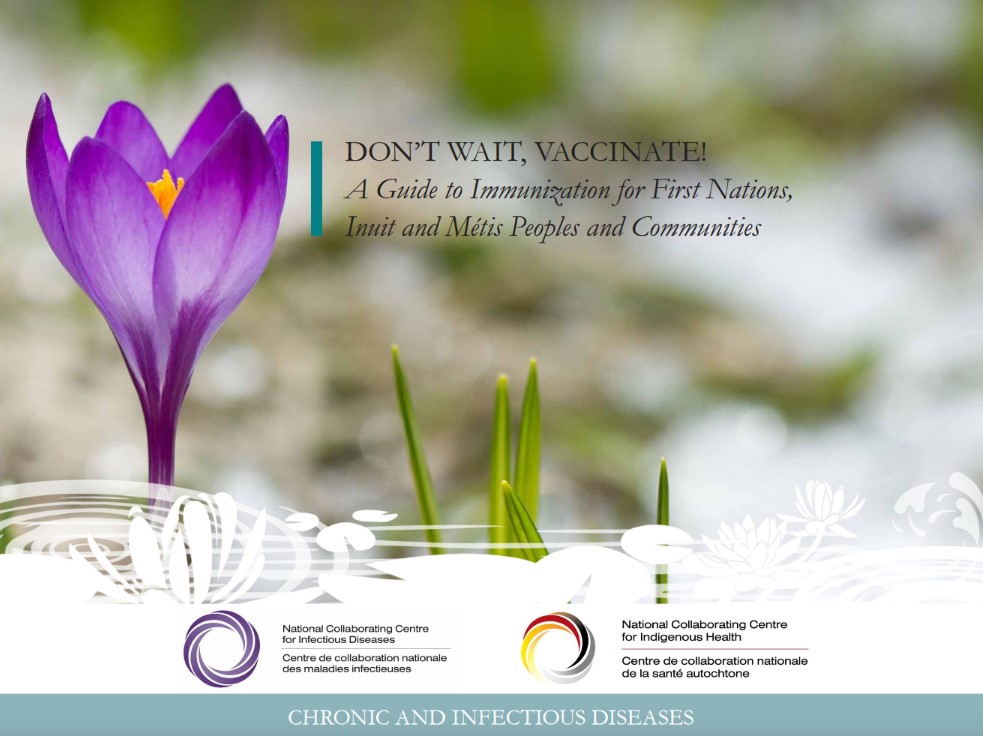Resources to support vaccine confidence among First Nations, Inuit, and Métis people and communities

The National Collaborating Centre for Indigenous Health (NCCIH), in collaboration with the National Collaborating Centre for Infectious Diseases (NCCID), has produced several resources to support vaccine confidence among First Nations, Inuit and Métis people and communities.
These resources include an immunization guide, an 18-month calendar, and two fact sheets for individuals, families, and communities, as well as three fact sheets intended for health professionals.
Immunization guide
Don't wait, vaccinate! A guide to immunization for First Nations, Inuit and Métis peoples and communities (1) explains what vaccines are and how they safely offer good protection against many contagious diseases across the lifespan. It includes additional information on immunization schedules and a list of trusted resources on vaccines and immunizations. The guide is also available in Cree, Ojibway, and Inuktitut.
(1.) Adapted from Don’t wait, vaccinate! A guide to immunization for First Nations, Inuit and Métis peoples and communities, 2012, by First Nations and Inuit Health Branch, Indigenous Services Canada.
Perpetual calendar
Don't wait, vaccinate! Immunization for First Nations, Inuit and Métis peoples and communities - 18-month perpetual calendar January to June (2) provides practical information on where and when to receive immunizations, along with what to expect when receiving a vaccine. It explains how to prepare children, youth, and adults to have a more comfortable experience when being immunized and how to address any possible side effects from vaccines. The calendar is also available in Cree, Ojibway, and Inuktitut.
(2.) Adapted from Don’t wait, vaccinate! Calendar for childhood immunization for First Nations, 2012, by First Nations and Inuit Health Branch, Indigenous Services Canada.
Resources for individuals, families, and communities
NCCIH and NCCID developed the following resources to provide First Nations, Inuit and Métis individuals, families, and communities with evidence-based information and facts on immunizations:
Information and resources to build vaccine confidence for First Nations, Inuit and Métis people
This fact sheet provides information on how vaccines work, their safety, and possible side effects. This evidence supports informed decision-making on immunizations. It is also available in Cree, Ojibway and Inuktitut.
Read the fact sheet
Vaccines – the facts
This fact sheet outlines basic facts on vaccine effectiveness and safety, testing and administration of vaccines, as well as the prevalence and risks of side effects associated with immunizations. It is also available in Cree, Ojibway and Inuktitut.
Read the fact sheet
Resources for health professionals
Talking about vaccination can be intimidating for doctors and patients alike. However, these conversations are important and help stop the spread of health-related misinformation for families and communities.These facts sheets help health professionals discuss immunizations with their patients.
Tips for conversations with patients about vaccinations
This fact sheet supports healthcare providers prepare for conversations and questions about immunizations. It reinforces the need to be aware of non verbal communication, to practice cultural safety, to provide credible information, and to maintain an open dialogue with First Nations, Inuit and Métis peoples on vaccines.
Read the fact sheet
Supporting vaccine confidence in First Nations, Inuit, and Métis communities
This fact sheet provides information so that healthcare providers can better understand vaccine hesitancy expressed by Indigenous patients. It offers strategies to support vaccine confidence with First Nations, Inuit and Métis peoples.
Read the fact sheet
Vaccine preventable diseases in Canada: What are they?
This fact sheet lists and describes vaccine-preventable diseases and when vaccinations are routinely offered to protect against them. It is also available in Cree, Ojibway and Inuktitut.
Read the fact sheet
Other resources
- Learn more about vaccines by watching Vaccine Confidence, a video produced by NCCIH and NCCID.
- Watch a recent NCCID webinar Seasonal Influenza Immunization 2022-2023.
- Discover NCCIH publications and multimedia resources related to vaccination.
- Explore vaccination-related external resources in NCCIH's Tuberculosis Collection.
- Explore further vaccination-related external resources in NCCIH's COVID-19 Collection.
Read the web story
-
By
Chronic and Infectious Diseases
-
Published
Feb 08, 2023
-
Subject Area
- Caregiving & Caregiver Support
- Indigenous Peoples & Indigenous Relations
- Immigrants, Refugees, & Multicultural Seniors
- COVID-19
- Health & Wellness - General
- Information, Referral, & Advocacy
- Elder Abuse, Frauds, & Scams
-
Audience
- Caregivers, Seniors & Volunteers
- Health Authorities
- Service Providers (Non-profits, Community Organizations, Local government)
- Academics
-
Category
- Best Practices
Newsletter
Sign up for the Healthy Aging CORE BC e-news to keep up-to-date with activity from the platform and the Community-Based Seniors Services (CBSS) sector across the country.
